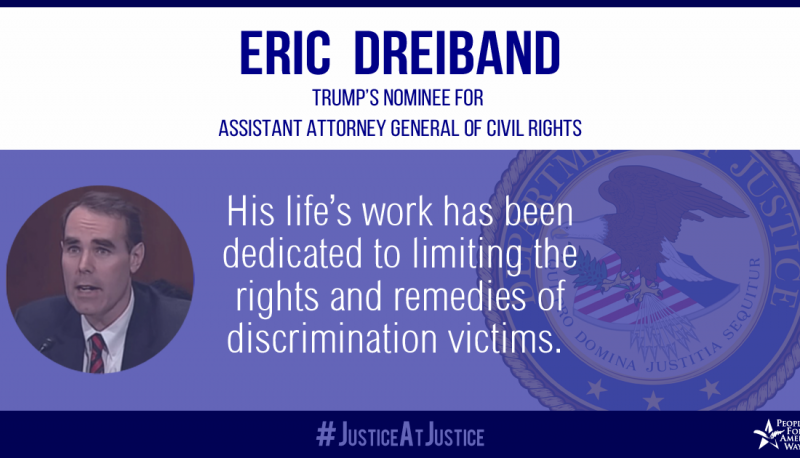Eric Dreiband—President Trump’s nominee to run DoJ’s Civil Rights Division—learned something important last January.
When Jeff Sessions lied under oath to the Senate Judiciary Committee at his confirmation hearing, Republicans rewarded his dishonesty by confirming him as the nation’s top lawyer. The message was clear: Ideology would trump honesty and law at the Sessions Justice Department, and that’s just fine with Senate Republicans.
Dreiband heard the message loud and clear. At his confirmation hearing, he was faced with the uncomfortable fact that he has spent much of his career opposing the rights his division is entrusted to protect. So he followed Sessions’ lead and flat-out lied.
Ranking Member Dianne Feinstein noted his opposition to the Lilly Ledbetter Fair Pay Act:
In 2008, you testified against the Lilly Ledbetter legislation, and that was a fair pay act. As you know, the Supreme Court threw out her pay discrimination case just because she didn’t sue Goodyear within 180 days of the company’s first decision to discriminate against her.
Why would you be opposed to equal pay for equal work?
But he would not acknowledge his opposition to the Fair Pay Act:
The testimony that I gave was not in opposition to the Lilly Ledbetter Fair Pay Act. Rather, my testimony … was advising the committee that there was an alternative [approach to the issue].
Really? Rewind nearly a decade, and here are three statements from Dreiband’s January 24, 2008 testimony:
[1] I am here today, at your invitation, to speak about the proposed Fair Pay Restoration Act. I do not believe that the bill would advance the public interest.
[2] As an alternative to the Fair Pay Restoration Act, Congress could codify the EEOC’s Compliance Manual standard for equitable tolling and equitable estoppel.
[3] The proposed Fair Pay Restoration Act would not be in the best interest of the American people.
In what universe does testifying that a bill will harm the public and should be replaced by a completely different alternative not constitute opposition to the bill?
It certainly made no sense to Sen. Richard Blumenthal:
Blumenthal: I want to come back to the Ledbetter issue because, I hadn’t intended to talk about it, but I was somewhat confused by your responses to Sen. Feinstein. You testified against the Fair Pay Restoration Act, correct?
Dreiband: … There seems to be some confusion about my testimony.
Blumenthal: Well, you testified against the act. In fact, you said that the bill, in your view, would not advance the public interest. You said it would result in “limitless monetary penalties” because of significant costs it would impose on employers. And I take your contention that you’re in favor of fair pay—I didn’t expect you to come here and say you’re in favor of pay discrimination—but in fact, that act was about enforcement of that right, correct?
And let me give you my understanding because you testified against it that it changed the limitation provision so that people like Lilly Ledbetter who were discriminated against wouldn’t have to prove that discrimination within 180 days of the initial decision. They could prove it within 180 days of the discriminatory paycheck. Without that change in the law, there would have been severe obstacles to enforcement. And you testified against that law which reversed the Supreme Court decision in the Ledbetter case. Am I correct, roughly?
Dreiband: Sen. Blumenthal, I think that is not a correct statement of my testimony.
Not a correct statement of his testimony? From his 2008 testimony:
The Fair Pay Restoration Act would require the EEOC to investigate events that happened years or decades before anyone files a charge, would force respondents to implement incredibly costly record-keeping or lose the ability to mount a defense, and would create unanticipated and potentially limitless monetary penalties for state and local governments, unions, employers, and others covered by the federal antidiscrimination laws. The bill may also create unforeseen and unanticipated liability for pension funds.
It’s clear that Sen. Blumenthal gave “a correct statement” of Dreiband’s testimony. Yet, under oath, Dreiband told the committee that “the testimony that I gave was not in opposition to the Lilly Ledbetter Fair Pay Act.”
Apparently, he defines “opposition” differently from everyone else. The same thing apparently goes for “the whole truth and nothing but the truth.”
Dreiband is banking on the Republicans’ enabling his mendacity. If the attorney general can brazenly lie to them under oath at his confirmation hearing, they won’t be bothered in the least if the nominee to lead the Justice Department’s Civil Rights Division follows in his footsteps.
The Judiciary Committee should reject Eric Dreiband’s nomination.

